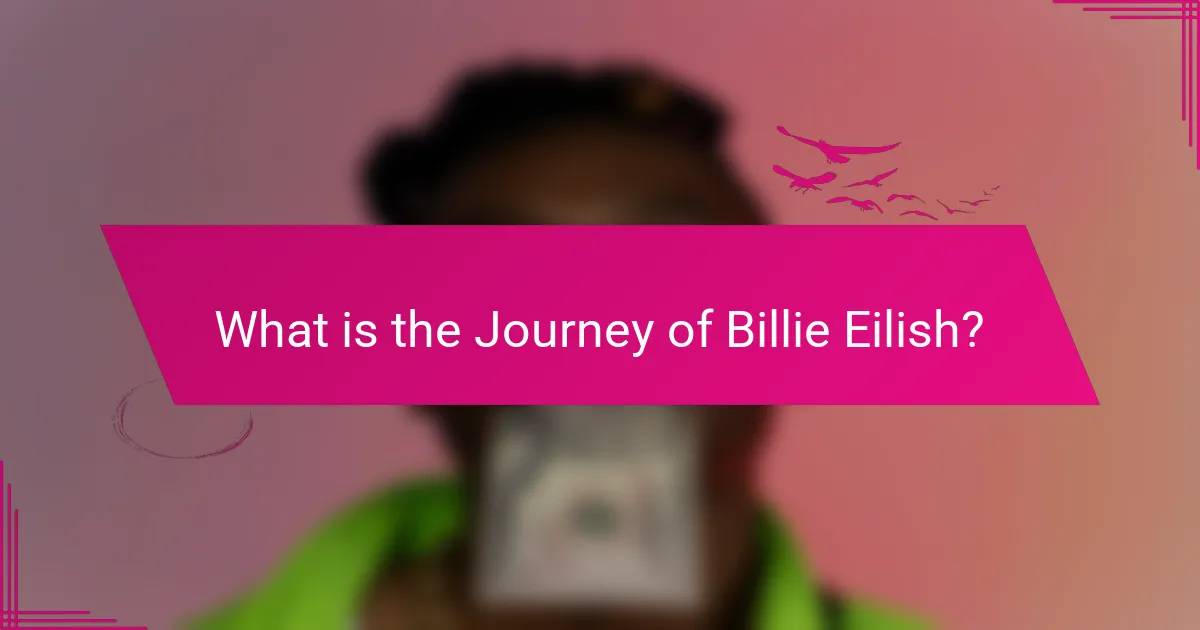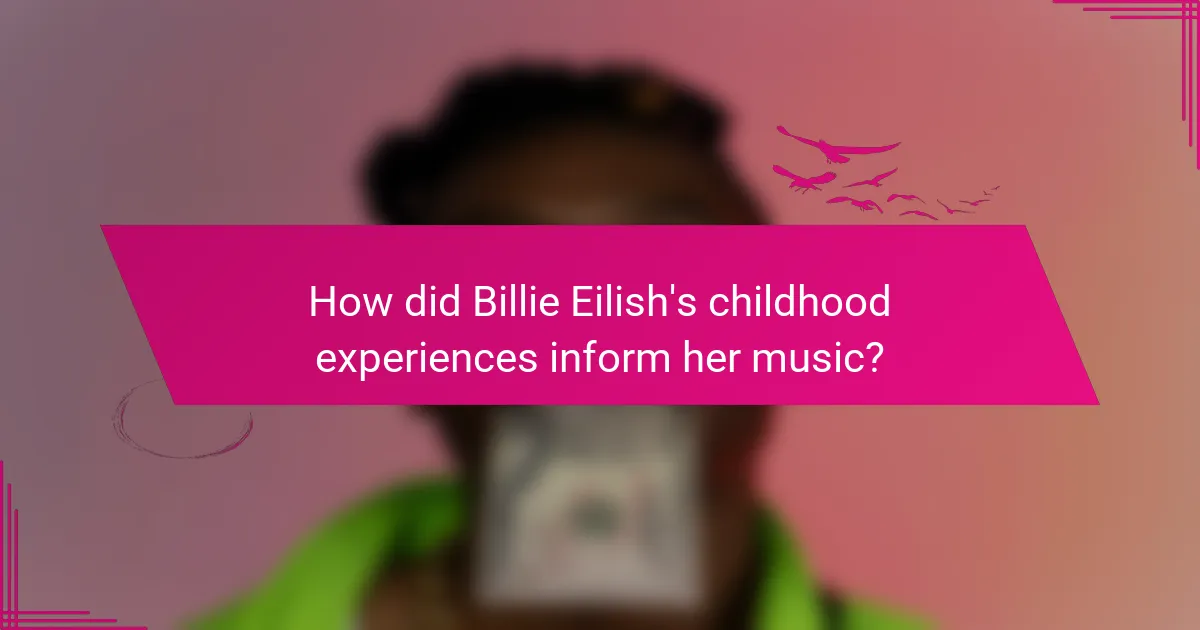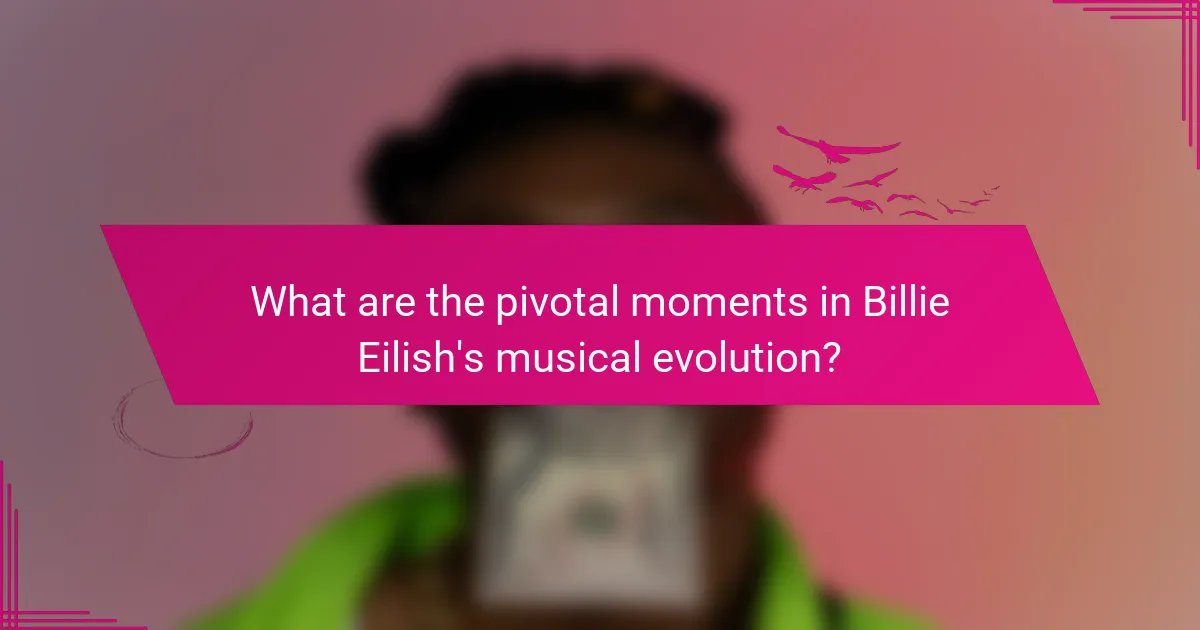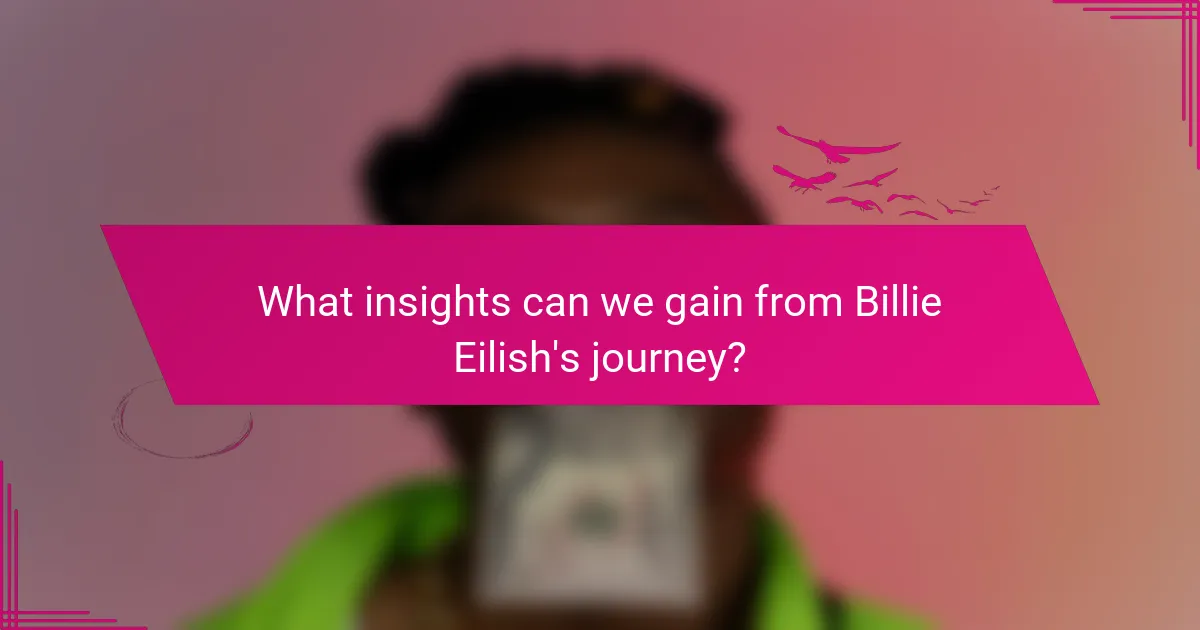Billie Eilish is a prominent American singer-songwriter whose journey in the music industry began in Los Angeles, California, where she was born in 2001. Influenced by her musical family, Eilish started writing songs at a young age, achieving significant recognition with her hit single “Ocean Eyes” in 2015. Her debut album, “When We All Fall Asleep, Where Do We Go?”, released in 2019, further established her as a leading artist, debuting at number one on the Billboard 200 chart and earning her multiple Grammy Awards. The article explores Eilish’s childhood experiences, her musical evolution, and her candid discussions about personal struggles, particularly with mental health, highlighting how these elements have shaped her artistic identity and resonated with her audience.

What is the Journey of Billie Eilish?
Billie Eilish’s journey began in Los Angeles, California, where she was born in 2001. She grew up in a musical family, which influenced her early interest in music. Eilish started writing songs at a young age, with her first major hit “Ocean Eyes” released in 2015. This song gained significant attention and marked her entry into the music industry.
Eilish’s unique sound blends pop, electronic, and alternative elements. Her debut album, “When We All Fall Asleep, Where Do We Go?”, released in 2019, solidified her status as a leading artist. It debuted at number one on the Billboard 200 chart. Eilish has won multiple Grammy Awards, showcasing her critical acclaim and popularity.
Throughout her career, she has openly discussed personal struggles, including mental health challenges. Eilish uses her platform to advocate for mental health awareness. Her journey reflects both her artistic evolution and her resilience in facing life’s challenges.
How did Billie Eilish’s childhood shape her artistic identity?
Billie Eilish’s childhood significantly influenced her artistic identity. Growing up in a creative family, she was exposed to music from an early age. Her parents, both musicians, encouraged her to explore various artistic avenues. Eilish began writing songs at age 11, which honed her songwriting skills. The isolation she felt as a child led to deeper emotional expression in her music. Additionally, her experiences with mental health issues shaped the themes in her work. Eilish’s unique sound emerged from her eclectic musical influences and personal experiences. These factors combined to create her distinctive artistic identity.
What early experiences influenced her musical interests?
Billie Eilish’s early experiences significantly influenced her musical interests. Growing up in a musical family, her parents encouraged creativity. She began writing songs at a young age, often inspired by her emotions. Eilish also drew influence from various genres, including pop and alternative music. Her early exposure to music through family gatherings shaped her artistic identity. Additionally, her experiences with mental health issues informed her songwriting. This combination of personal and familial influences created a strong foundation for her musical journey.
How did her family background contribute to her creativity?
Billie Eilish’s family background significantly contributed to her creativity. Growing up in a musical household, both her parents were artists. Her mother, Maggie Baird, is a musician and songwriter, while her father, Patrick O’Connell, is an actor and musician. This environment fostered artistic expression from an early age. Eilish and her brother, Finneas, collaborated on music together, enhancing their creative synergy. The family’s encouragement of individuality allowed her to explore various musical styles. This supportive atmosphere cultivated her unique sound and artistic vision. Eilish’s experiences in this nurturing environment shaped her approach to songwriting and performance.
What key events marked Billie Eilish’s musical evolution?
Billie Eilish’s musical evolution was marked by several key events. In 2015, she released her debut single “Ocean Eyes,” which gained significant attention. This song was written by her brother Finneas O’Connell and showcased her unique sound. In 2017, Eilish released her EP “Don’t Smile at Me,” which included hits like “Bellyache” and “Idontwannabeyouanymore.” This project solidified her presence in the music industry. In 2019, she released her debut studio album “When We All Fall Asleep, Where Do We Go?” It debuted at number one on the Billboard 200 chart. Eilish won five Grammy Awards in 2020, including Album of the Year. These milestones reflect her rapid rise and artistic development. Each event contributed to her distinctive style and broad appeal.
How did her early releases impact her career trajectory?
Billie Eilish’s early releases significantly propelled her career trajectory. Her debut single, “Ocean Eyes,” gained widespread attention on SoundCloud in 2016. This song showcased her unique sound and lyrical depth, attracting major label interest. Following this, her EP “Don’t Smile at Me” solidified her position in the music industry. The EP debuted on the Billboard 200 chart, highlighting her commercial viability. Eilish’s early releases established a loyal fan base and critical acclaim. They also paved the way for her Grammy wins, demonstrating the impact of her initial work on her long-term success.
What role did collaborations play in her development as an artist?
Collaborations significantly influenced Billie Eilish’s development as an artist. They allowed her to explore diverse musical styles and expand her creative boundaries. Working with producers like her brother Finneas O’Connell helped shape her unique sound. Their partnership led to the creation of chart-topping hits that garnered critical acclaim. Collaborations with other artists introduced her to new audiences and perspectives. This exposure enriched her artistry and inspired her songwriting. Eilish’s collaborations have contributed to her evolution from a bedroom artist to a global music icon.
What personal struggles has Billie Eilish faced throughout her journey?
Billie Eilish has faced several personal struggles throughout her journey. She has dealt with mental health issues, including depression and anxiety. Eilish has openly discussed her experiences with body image issues. She has also faced the pressures of fame at a young age. Eilish experienced isolation due to her unique style and music. She has navigated family challenges, including her brother Finneas’s role in her career. Eilish’s struggles with self-identity have been a recurring theme in her music. These personal challenges have significantly influenced her artistic expression and songwriting.
How have mental health issues influenced her music and public persona?
Mental health issues have significantly influenced Billie Eilish’s music and public persona. Eilish openly discusses her struggles with anxiety and depression in her songs. This candidness resonates with her audience, creating a strong emotional connection. Her lyrics often reflect feelings of isolation and vulnerability. This authenticity has shaped her image as an artist who is relatable and genuine. Eilish’s mental health challenges have also led her to advocate for mental health awareness. She uses her platform to encourage conversations about mental health. This advocacy enhances her public persona as a voice for young people facing similar issues.
What challenges did she encounter with fame and public scrutiny?
Billie Eilish faced significant challenges with fame and public scrutiny. She experienced intense media attention that often misrepresented her. This scrutiny led to anxiety and stress, affecting her mental health. Eilish also dealt with criticism regarding her appearance and fashion choices. The pressure to maintain a public persona created feelings of isolation. She often felt misunderstood by both fans and critics. Eilish has spoken openly about her struggles with self-image due to public perception. These challenges highlight the complexities of navigating fame in the music industry.

How did Billie Eilish’s childhood experiences inform her music?
Billie Eilish’s childhood experiences significantly influenced her music. Growing up in a creative household, she was exposed to various musical styles from an early age. Her parents, both musicians, encouraged her artistic expression. Eilish faced challenges such as anxiety and depression during her youth. These experiences shaped her lyrical themes, often reflecting feelings of isolation and vulnerability. Her home environment fostered experimentation with sound and songwriting. Eilish’s early songwriting began at age 11, showcasing her unique voice. The blend of personal struggles and familial support created a distinct musical identity. This foundation has been pivotal in her artistic evolution.
What themes from her childhood are prevalent in her lyrics?
Billie Eilish’s lyrics often reflect themes of isolation and anxiety from her childhood. She frequently addresses feelings of loneliness and emotional struggles. These themes stem from her upbringing in a close-knit but complex family environment. Eilish has spoken about battling anxiety and depression during her formative years. This personal experience shapes her songwriting, creating relatable narratives for listeners. The influence of her childhood is evident in songs like “Bellyache” and “When the Party’s Over.” These tracks echo her internal conflicts and emotional depth. Eilish’s lyrics resonate with many who have faced similar challenges in their youth.
How does she express her childhood emotions in her songs?
Billie Eilish expresses her childhood emotions in her songs through vivid storytelling and personal anecdotes. She often reflects on her experiences growing up in Los Angeles. Her lyrics convey feelings of nostalgia, insecurity, and vulnerability. Eilish uses imagery to paint a picture of her childhood memories. Songs like “When the Party’s Over” highlight her emotional struggles. She addresses themes of loneliness and anxiety that stem from her early years. The rawness of her voice adds authenticity to her messages. Eilish’s ability to connect with listeners stems from her honest portrayal of childhood emotions.
How did her upbringing affect her connection with fans?
Billie Eilish’s upbringing significantly shaped her connection with fans. Growing up in a creative household, she was encouraged to express herself through music. This environment fostered authenticity in her artistry. Eilish often shares personal experiences in her songs. Fans relate to her vulnerability and honesty. Her upbringing included struggles with mental health, which resonates with many listeners. This shared experience builds a strong emotional bond with her audience. Eilish’s unique perspective, shaped by her childhood, creates a sense of community among her fans.
What messages does she convey through her personal experiences?
Billie Eilish conveys messages of vulnerability, resilience, and authenticity through her personal experiences. Her songs often reflect struggles with mental health, illustrating the importance of acknowledging one’s feelings. Eilish emphasizes the value of self-acceptance and embracing imperfections. She shares her journey of growing up in the public eye, highlighting the pressures of fame. Through her music, she encourages listeners to be true to themselves. Eilish’s experiences resonate with many, fostering a sense of community among her fans. Her openness about personal challenges serves as a source of empowerment for others facing similar issues.

What are the pivotal moments in Billie Eilish’s musical evolution?
Billie Eilish’s musical evolution features several pivotal moments. The release of her debut single “Ocean Eyes” in 2015 marked her breakthrough. This song garnered significant attention and showcased her unique sound. Collaborating with her brother Finneas O’Connell was crucial. Their partnership produced the critically acclaimed EP “Don’t Smile at Me” in 2017. This project solidified her presence in the music industry.
Winning multiple Grammy Awards in 2020 was another significant milestone. Eilish became the youngest artist to win the prestigious awards in all four major categories. The release of her album “When We All Fall Asleep, Where Do We Go?” in 2019 further demonstrated her artistic growth. This album debuted at number one on the Billboard 200 chart.
Her performance at Coachella in 2019 showcased her live performance abilities. Eilish’s evolution reflects her ability to connect with a diverse audience. Each of these moments contributed to her status as a leading figure in contemporary music.
What milestones define her career progression?
Billie Eilish’s career progression is defined by several key milestones. She gained initial recognition with her debut single “Ocean Eyes” in 2015. This song was released on SoundCloud and quickly went viral. In 2017, her EP “Don’t Smile at Me” was released, showcasing her unique sound. The EP included hits like “Bellyache” and “Idontwannabeyouanymore.” In 2019, Eilish released her debut studio album “When We All Fall Asleep, Where Do We Go?” This album debuted at number one on the Billboard 200 chart. Eilish won five Grammy Awards in 2020, including Album of the Year. In 2021, she released her second studio album “Happier Than Ever,” which also received critical acclaim. These milestones highlight her rapid rise in the music industry and her influence on contemporary pop culture.
How did her debut album impact her recognition in the music industry?
Her debut album, “When We All Fall Asleep, Where Do We Go?”, significantly enhanced Billie Eilish’s recognition in the music industry. Released in March 2019, it debuted at number one on the Billboard 200 chart. The album’s unique sound and introspective lyrics resonated with a wide audience. It garnered critical acclaim, winning multiple Grammy Awards, including Album of the Year. This recognition solidified her status as a leading artist in pop music. The album’s commercial success included over 3 million copies sold in the United States alone. Overall, her debut album established her as a prominent figure in the contemporary music landscape.
What innovations has she brought to the music scene?
Billie Eilish has brought several innovations to the music scene. She has popularized the use of whispery vocals and minimalist production. This style creates an intimate listening experience. Eilish often blends pop with elements of electronic and alternative music. Her approach to songwriting addresses themes of mental health and personal struggles. This resonates deeply with her audience, particularly younger listeners. Eilish also emphasizes visual storytelling through her music videos. Her unique aesthetic challenges conventional norms in the industry. These innovations have significantly influenced contemporary music trends.
How has her unique style influenced contemporary pop music?
Billie Eilish’s unique style has significantly influenced contemporary pop music. Her sound blends various genres, including pop, electronic, and indie elements. This genre fusion encourages artists to experiment with their musical boundaries. Eilish’s use of whispery vocals creates an intimate atmosphere that resonates with listeners. This approach has inspired many artists to adopt a more personal and vulnerable style. Additionally, her fashion choices challenge traditional pop aesthetics, promoting individuality and self-expression. Eilish’s authenticity fosters a deeper connection with her audience, setting a new standard in pop music. Her impact is evident in the rise of artists who emulate her sound and style.

What insights can we gain from Billie Eilish’s journey?
Billie Eilish’s journey offers insights into resilience, authenticity, and the impact of mental health on creativity. Her rise to fame began with the release of “Ocean Eyes” at age 14. This song showcased her unique sound and songwriting ability. Eilish’s candid discussions about anxiety and depression resonate with many fans. She emphasizes the importance of self-acceptance and staying true to oneself. Eilish’s success illustrates how personal experiences can shape artistic expression. Her evolution reflects a blend of vulnerability and strength in navigating the music industry. Through her journey, Eilish inspires others to embrace their individuality and confront their struggles.
What lessons can aspiring artists learn from her experiences?
Aspiring artists can learn resilience and authenticity from Billie Eilish’s experiences. Eilish faced numerous challenges in her career, including mental health struggles. She openly discusses her battles with anxiety and depression, highlighting the importance of mental well-being. Her commitment to creating music that reflects her true self teaches the value of authenticity. Eilish’s unique sound emerged from embracing her individuality. She also emphasizes the importance of collaboration, working closely with her brother Finneas. This partnership showcases how teamwork can enhance creativity. Lastly, her rise to fame despite initial setbacks demonstrates that perseverance is key in the music industry.
How can artists navigate personal struggles while pursuing their careers?
Artists can navigate personal struggles while pursuing their careers by establishing a strong support system. This includes seeking guidance from mentors and peers. They can also engage in self-care practices to maintain mental well-being. Regularly expressing their emotions through art can provide therapeutic benefits. Setting realistic goals helps manage expectations and reduces stress. Many artists find that maintaining a routine fosters stability amid challenges. Research indicates that resilience training can enhance coping strategies for artists facing personal issues. Additionally, professional therapy can offer valuable tools for managing emotional difficulties.
The main entity of the article is Billie Eilish, a prominent music artist known for her unique sound and impactful lyrics. The article explores her journey from childhood in a musical family in Los Angeles to her rise in the music industry, highlighting key milestones such as the release of her hit single “Ocean Eyes” and her Grammy-winning debut album “When We All Fall Asleep, Where Do We Go?”. It also delves into her personal struggles with mental health and how these experiences have shaped her artistic identity and connection with fans. Additionally, the article discusses the significance of her collaborations, innovations in music style, and the lessons aspiring artists can learn from her experiences.